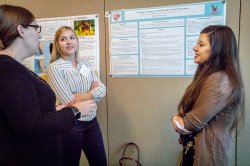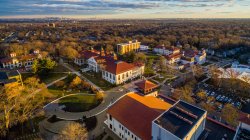Symposium Showcases Student Research
At the University’s 12th annual Student Research Symposium in the spring, 320 students showed how they apply the challenges and techniques of microbiologists, sociologists, anthropologists, psychologists, accountants, musicians, filmmakers, journalists, teachers and public health specialists to a range of questions, issues and problems.
Among the presenters was Clinical Psychology graduate student Jacqueline Lawrence, who heads a team of student researchers examining the healing of emotional scars suffered when first responders rush to the scene of tragedies.
“First responders know what they are getting into,” says Lawrence, a paramedic-firefighter who works on campus as managing director of emergency medical services for University Police. But that doesn’t lessen the mental toll, she says.
Other student researchers also tackled problems with multiple methodologies and multidisciplinary approaches, providing a rich perspective on topics from the economic benefits of marijuana legalization to mathematical models in cancer research. Presentations were organized by themes: Applications of Marketing and Sustainability; Language and Power; Gender, Economy and the Law; Educational Evaluation; and The Psychology of Race.
Robert Welch, a senior majoring in Political Science and minoring in Arabic Studies, as well as a classically trained musician, studied the connection between music, revolution and politics in “The Sounds of Revolution: Rethinking How We Hear Change.” Conflict in Egypt inspired him to write a symphony, which led to the research. “It restored a lot of my previous drive in learning, and also pushed me to really go out of my comfort zone and ask questions that I previously would have been intimidated by,” Welch says.
Students answered questions about their research, methods and conclusions. Lawrence, for example, shared the floor with students in Montclair State’s trauma and resiliency lab. They surveyed more than 600 first responders across the country, in Puerto Rico and in the Virgin Islands to find out whether they cope with the situations better or have psychological issues they’re not reporting, Lawrence says.
Joseph Mettle, a senior Jurisprudence, Law and Society major, studied current weather patterns compared to past centuries. “Climate change is real and of great concern to all of us around the globe,” he concluded in “Climate Change, Global Warming and the First Amendment.”
“The Student Research Symposium definitely empowers our students to see the relevance of their work to the wider world,” says Jessica Brandt, associate director of student affairs, College of Humanities and Social Sciences.

